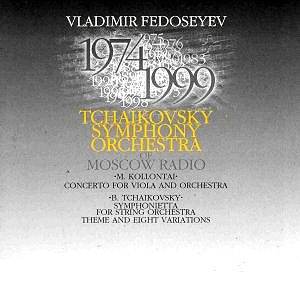Boris Tchaikovsky Society:http://www.mmv.ru/p/bt/
If it is played by
Yuri Bashmet the chances are that it
will be worth your listening time. This
Relief CD showcases the very obscure
Viola Concerto by composer-pianist
Mikhail Yermolayev (who goes
under the name Mikhail Kollontai)
alongside two concert works by Boris
Tchaikovsky. This is evidently a serious
piece of creative work running symphonic
proportions. It is strenuous, determined
and heatedly rhapsodic and is not afraid
of a sunny cantabile (Adagio - 2.34
onwards; tr. 3) even if it does sour
into disenchantment. Bashmet carries
the last element with something approaching
vehement belligerence. The music is
not difficult to come to terms with.
It lies within the coordinates established
by Walton (Violin Concerto and Viola
Concerto), RVW (Lark Ascending),
Bloch (Schelomo), Bartók
(Second Violin Concerto), Barber (Violin
Concerto) and Rózsa (Violin Concerto).
The work follows a not untypical pattern
for such concertos - slow-fast-slow
(Moeran, Delius, Walton). The central
Allegro ruthlessly skips and
rushes with syncopated material but
ends in a sly dialogue between piano
and viola. The work’s coherence is emphasised
by the sharing of melodic material across
the three movements.
Boris Tchaikovsky’s
Sinfonietta (or Symphonietta)
for String Orchestra is from 1953. Like
the Clarinet Concerto (1957) on the
Northern
Flowers label the writing for string
orchestra embraces a long singing Finzian
approach. There are moments when you
could swear you are hearing the string
writing from Dies Natalis (tr.4).
Prokofiev is the background voice in
the rondel-style Valse second
movement. The Adagio (Variations)
are questioningly searching and heartfelt
- not tragic but a serious contemplation
with beauty the subject matter. The
final Rondo is mercurial with
brightness, cheerful and muscular; in
fact not that distant from the march
from the Wirén Serenade or
the Tippett Concerto for Double String
Orchestra. That muscularity must
have pleased the anti-formalists but
it still sounds well.
The Theme and
Variations is for full orchestra
and is set down here in a single track.
Fedoseyev and his orchestra have known
this piece since its early days. It
was a commission of the Dresden Staatskapelle
for Dresden’s 425th anniversary celebration.
Out of timorous wisps and spectral pizzicati
ideas and melodic gestures float free.
It is not at all as Webernian as this
description might suggest. There is
more acrid and buzz-saw material in
the veins of this piece than you find
in the almost honeyed Sinfonietta.
The chatter sweetens with woodwind and
celesta at 8.30 onwards and the chaffing
is lent emphasis and sharp punctuation
by the choir of French Horns. After
this Tchaikovsky resorts very briefly
to some pecked and off-beat stabbing
chords before returning to an inward
communing. This is the most challenging
piece on the disc.
Will satisfy the curiosity
of those wanting to chart the progress
of Soviet orchestral music. Both the
Kollontai and the Boris Tchaikovsky
Sinfonietta make an immediate and attractive
impression.
Rob Barnett
